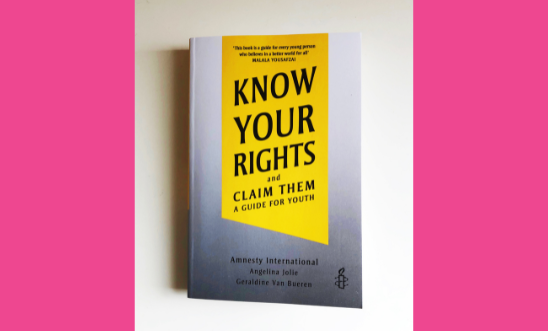
Knowledge is power - Shining a light on child rights in school libraries

Blog written by Nicky Parker, Publisher & Literary Partnerships Lead at Amnesty International
‘This book is a golden guide which provides hope for everyone, not just children!’ - Vinuki, age 14
Whatever your background or postcode, religion or race, all children and young people deserve to thrive. Child rights are there to support your emotional, physical, mental and spiritual wellbeing.
Here's 5 things you need to know about children’s human rights:
-
Children and young people under 18 have your own set of human rights: the UN Convention on the Rights of the Child (UNCRC)
-
The UNCRC is the most ratified human rights treaty in the world - it means governments promise to make it law
-
Child rights include rights to life, health, food and a safe place to live
-
The rights to play, learn and use your voice are included too
-
You have the right to access information and take part in decisions affecting you
Child rights are precious, but little known. Learn more about what we’ve done to change that below.
You literally have the right to know your rights!
196 governments have ratified the UNCRC- including the UK. They have all committed to educate all children and adults about child rights. But - guess what? According to a YouGov poll of 2021, 85 per cent of UK children aged 8 to 15 know little or nothing about child rights.
We have to do something about it.
But why does knowing your rights matter?
If you don't know your rights -or even that you have them- it can make you more vulnerable to abuse, discrimination and exploitation. It's almost impossible to speak up or take action.
This is why we teamed up with Angelina Jolie and Professor Geraldine Van Bueren to write a book for teenagers. In Know Your Rights and Claim Them: A Guide for Youth, we lay out child rights- clearly and simply.
You don’t need to be a lawyer to know how to speak up for yourself, your family and friends!
But books need to be taken where they’re most needed. This is why we also partnered with the School Library Association and Lightbulb Trust. Together, we’ve been sending free books to reach some of the young people who need them most.
What’s the link between school libraries and child rights?
In 2023 an estimated one in four children are living in poverty in the UK. You still have child rights, but poverty makes it harder to enjoy them. School libraries help level the playing field for all children and young people, no matter who you are. They are centres of knowledge and learning for everyone.
But there’s a problem. New research from the Great School Libraries campaign shows that not all schools have equal school library provision. If you go to a school with a higher percentage of children eligible for Free School Meals, your school is less likely to have the resources for a school library. This has serious child rights impacts.
Last year the National Literacy Trust asked children and young people between 8 to 18 how many books they owned. Their research showed that 1 in 15 (6.5%) may not have access to any books at home.
Put two and two together and what do you find? There’s a clear risk that many children and young people without access to a library will never hold a book other than a school text. It’s a perfect storm. Your rights are not being upheld as well as they should.
Spreading knowledge: Know your rights and claim them
The Lightbulb Trust has supported Amnesty’s partnership with the School Library Association. Together, we've put the book in 274 libraries across London. It's also in twelve National Literacy Hubs. We've also given free child rights activities, to help librarians explore the issue with young people.
School library staff have told us how young people are more knowledgeable about their rights now.
‘This book is an important starting point for educating children about their rights, and for adults to understand what they are and why they're important.’ - Alison Tarrant, Chief Executive, School Library Association
What can you do now?
- You can get the book too, either from your library or Amnesty
- Try our free online course: An Introduction to Child Rights (for adults and keen teens)
- Download a free Child Rights poster
- Get our Child Rights Chatterbox to bring child rights to life
Our blogs are written by Amnesty International staff, volunteers and other interested individuals, to encourage debate around human rights issues. They do not necessarily represent the views of Amnesty International.
0 comments